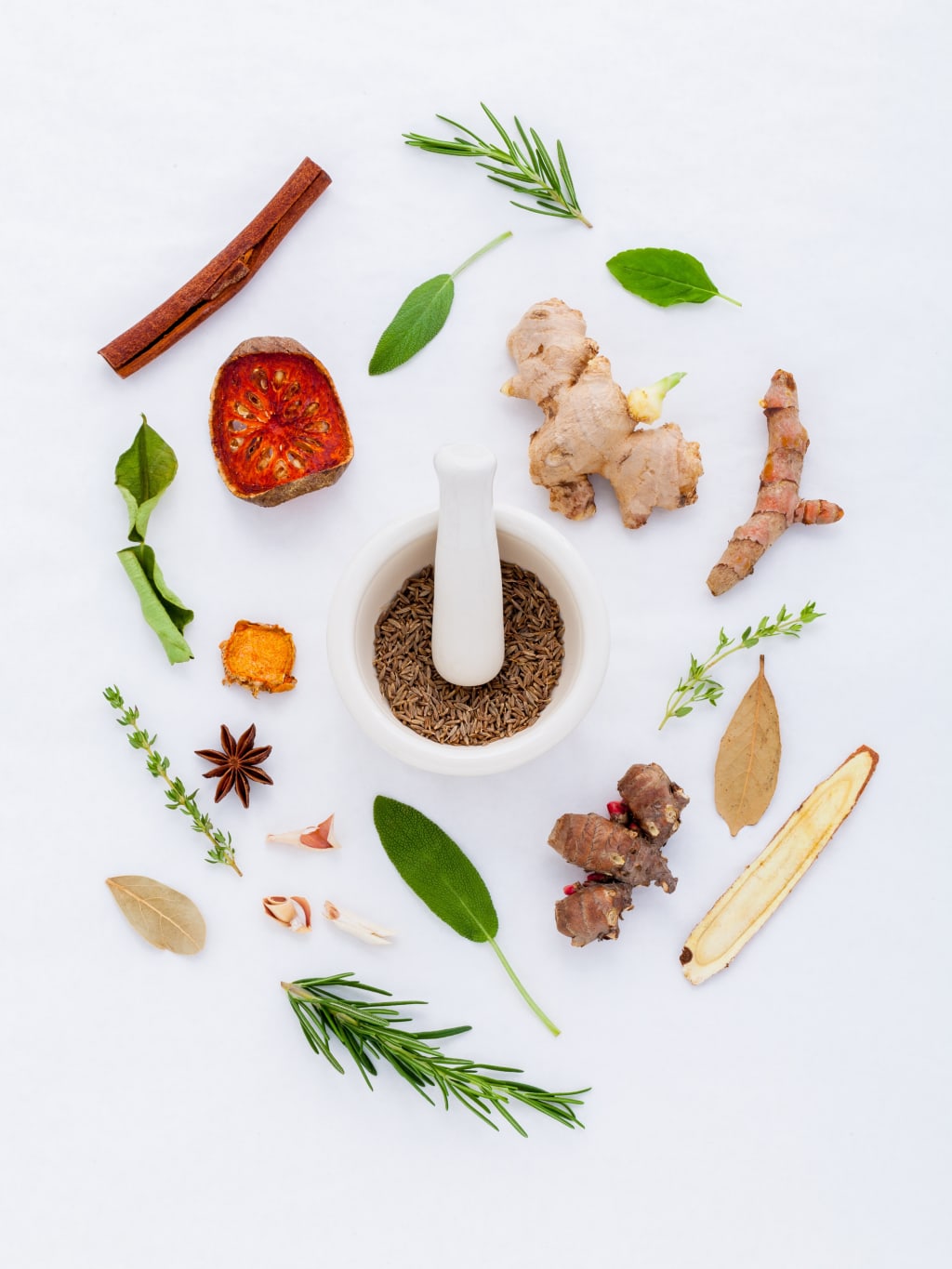Content warning
This story may contain sensitive material or discuss topics that some readers may find distressing. Reader discretion is advised. The views and opinions expressed in this story are those of the author and do not necessarily reflect the official policy or position of Vocal.
History of Herbal Medicine
Ancient Wisdom Rediscovered

History of Herbal Medicine
Ancient Wisdom Rediscovered
Table of Contents
* Introduction: Embracing the Power of Nature
* Origins of Herbal Medicine: An Ancient Legacy
* 2.1 Early Beginnings: Herbal Remedies in Ancient Civilizations
* 2.2 The Wisdom of Traditional Chinese Medicine
* 2.3 Ayurveda: India's Ancient Herbal Tradition
* Herbology in the Classical World
* 3.1 Greek Contributions to Herbal Medicine
* 3.2 Roman Influence on Herbal Practices
* Medieval Herbalism: From Monasteries to the Masses
* 4.1 Herbalists, Wise Women, and Folklore
* 4.2 The Herbal Renaissance
* Exploring the New World: Native American Herbal Remedies
* The Scientific Revolution and Modern Herbal Medicine
* 6.1 Shifting Perspectives: From Herbalism to Pharmacology
* 6.2 The Rise and Fall of Botanical Medicine
* Revival of Herbal Medicine in the 21st Century
* 7.1 Traditional Medicine in Contemporary Healthcare
* 7.2 The Herbal Supplements Industry
* Rediscovering the Healing Power of Plants
* The Art and Science of Herbal Medicine
* Integrating Herbal Medicine into Modern Lifestyles
* Embracing Sustainability: Herbal Medicine and the Environment
* Debunking Myths and Misconceptions About Herbal Medicine
* The Future of Herbal Medicine: Bridging Tradition and Innovation
* Harnessing the Healing Potential: Research and Regulation
* Conclusion: Embracing Herbal Medicine in Our Lives
Introduction: Embracing the Power of Nature
In a world dominated by modern medicine and cutting-edge pharmaceuticals, it is easy to overlook the ancient wisdom that lies within the realm of herbal medicine. Herbal medicine, also known as herbology or botanical medicine, is an age-old practice that harnesses the healing power of plants to treat a wide range of ailments. As humanity journeys forward in the pursuit of scientific advancements, there has been a rekindling of interest in the historical roots of herbal remedies. Let us embark on a journey through time to explore the fascinating history of herbal medicine and discover how this ancient knowledge is still relevant in today's world.
1. Origins of Herbal Medicine: An Ancient Legacy
2.1 Early Beginnings: Herbal Remedies in Ancient Civilizations
The roots of herbal medicine can be traced back to the earliest human civilizations. In ancient Mesopotamia, Egypt, and beyond, herbal remedies were an integral part of daily life. Early healers and shamans discovered the therapeutic properties of various plants, using them to alleviate pain, promote healing, and restore balance within the body.
2.2 The Wisdom of Traditional Chinese Medicine
China boasts one of the most profound herbal traditions in the world. Traditional Chinese Medicine (TCM) is based on the concept of balancing the body's vital energy or "qi." Chinese herbalists carefully curated potent blends of herbs to address specific health imbalances, a practice that continues to flourish even in modern times.
2.3 Ayurveda: India's Ancient Herbal Tradition
Ayurveda, the ancient healing system of India, places great emphasis on herbal remedies to create harmony between the mind, body, and soul. Ayurvedic practitioners utilize the knowledge of plants to create personalized treatments tailored to each individual's unique constitution.
3. Herbology in the Classical World
3.1 Greek Contributions to Herbal Medicine
The Greeks, notably figures like Hippocrates and Dioscorides, made significant contributions to herbal medicine. Hippocrates, often regarded as the father of modern medicine, believed in the body's innate ability to heal itself with the help of herbal remedies. Dioscorides, a Greek physician, compiled an extensive herbal encyclopedia, "De Materia Medica," which became a cornerstone of herbal knowledge for centuries to come.
3.2 Roman Influence on Herbal Practices
The Romans adopted much of their herbal knowledge from the Greeks and other cultures they encountered. They integrated these practices into their daily lives, and the use of herbs for medicinal purposes became widespread throughout the Roman Empire.
4. Medieval Herbalism: From Monasteries to the Masses
4.1 Herbalists, Wise Women, and Folklore
During the Middle Ages, herbal knowledge was preserved and expanded upon by monks in monasteries. Additionally, wise women and folk healers played a crucial role in passing down herbal remedies through generations via oral tradition.
4.2 The Herbal Renaissance
The Renaissance period saw a resurgence of interest in the classical knowledge of herbal medicine. Herbal texts were translated and disseminated, contributing to the gradual evolution of herbalism.
5. Exploring the New World: Native American Herbal Remedies
The exploration of the New World introduced European settlers to a vast array of medicinal plants used by Native American tribes. This exchange of herbal knowledge between cultures enriched the repertoire of herbal medicine worldwide.
6. The Scientific Revolution and Modern Herbal Medicine
6.1 Shifting Perspectives: From Herbalism to Pharmacology
The Scientific Revolution of the 17th century brought about a shift in the approach to medicine. Allopathic medicine gained prominence, leading to a decline in the use of herbal remedies in favour of synthetic drugs.
6.2 The Rise and Fall of Botanical Medicine
However, in the 19th century, there was a revival of interest in botanical medicine as researchers began isolating active compounds from plants to create modern drugs. This resurgence was short-lived due to a lack of standardization and regulations.
7. Revival of Herbal Medicine in the 21st Century
7.1 Traditional Medicine in Contemporary Healthcare
As we progress into the 21st century, there is a growing recognition of the value of traditional medicine, including herbal practices, in complementing modern healthcare.
7.2 The Herbal Supplements Industry
The herbal supplements industry has experienced exponential growth, with people turning to natural remedies to support overall health and well-being.
8. Rediscovering the Healing Power of Plants
In recent times, scientific research has validated the effectiveness of many traditional herbal remedies, reigniting interest in the healing power of plants.
9. The Art and Science of Herbal Medicine
Herbal medicine is both an art and a science, requiring a deep understanding of the properties and interactions of plants.
10. Integrating Herbal Medicine into Modern Lifestyles
As people seek alternative approaches to health, incorporating herbal medicine into modern lifestyles has gained popularity.
11. Embracing Sustainability: Herbal Medicine and the Environment
The sustainable cultivation and harvest of medicinal plants are essential to ensure the preservation of herbal medicine for future generations.
12. Debunking Myths and Misconceptions About Herbal Medicine
Addressing misconceptions and promoting accurate information is crucial to understanding the true potential of herbal medicine.
13. The Future of Herbal Medicine: Bridging Tradition and Innovation
Balancing ancient knowledge with modern scientific advancements is key to shaping the future of herbal medicine.
14. Harnessing the Healing Potential: Research and Regulation
Further research and proper regulation will enhance the credibility and safety of herbal medicine.
15. Conclusion: Embracing Herbal Medicine in Our Lives
In conclusion, the history of herbal medicine is a testament to the enduring wisdom of ancient civilizations. By embracing this knowledge and combining it with modern science, we can unlock the full potential of herbal remedies in promoting health and well-being.
FAQs (Frequently Asked Questions)
* Are herbal remedies safe to use?
* Herbal remedies can be safe when used correctly and under the guidance of qualified practitioners. However, it is essential to consult healthcare professionals before using any herbal supplements, especially if you are taking medications or have underlying health conditions.
* Can herbal medicine cure serious illnesses?
* While herbal medicine can complement conventional treatments and support overall health, it is not a substitute for medical intervention in the case of serious illnesses. Always seek medical advice for severe health conditions.
* Is herbal medicine suitable for children?
* Herbal medicine can be suitable for children, but it should be administered with caution and appropriate dosage. It is best to consult pediatric healthcare professionals before using herbal remedies for children.
* What herbs are commonly used in herbal medicine?
* There is a vast range of herbs used in herbal medicine, including popular ones like chamomile, ginger, garlic, and echinacea. Different cultures and traditions may utilize various herbs for specific health purposes.
* Are there any side effects of herbal remedies?
* Herbal remedies can have side effects, just like any other form of medication. Some individuals may experience allergic reactions or interactions with other medications. It is crucial to be informed and seek professional advice when using herbal remedies.
About the Creator
Sadaqat Hayat
Sadaqat Hayat is a passionate and talented article writer with a flair for storytelling and a deep love for words. With a strong command of the English language and a keen eye for detail





Comments
There are no comments for this story
Be the first to respond and start the conversation.